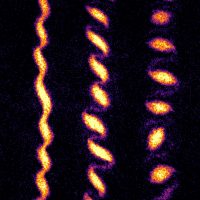News
Physicists watch as ultracold atoms form a crystal of quantum tornadoes
The world we experience is governed by classical physics. How we move, where we are, and how fast we’re going are all determined by the classical assumption that we can only exist in one place at any one moment in time.
But in the quantum world, the behavior of individual atoms is governed by the eerie principle that a particle’s location is a probability. An atom, for instance, has a certain chance of being in one location and another chance of being at another location, at the same exact time.
When particles interact, purely as a consequence of these quantum effects, a host of odd phenomena should ensue. But observing such purely quantum mechanical behavior of interacting particles amid the overwhelming noise of the classical world is a tricky undertaking.
Now, MIT physicists have directly observed the interplay of interactions and quantum mechanics in a particular state of matter: a spinning fluid of ultracold atoms. Researchers have predicted that, in a rotating fluid, interactions will dominate and drive the particles to exhibit exotic, never-before-seen behaviors.
